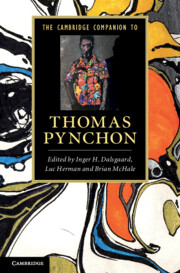10 - Politics
from PART III - ISSUES
Published online by Cambridge University Press: 28 March 2012
Summary
Along with their encyclopedic scope and vast collective commentary upon modern history, Pynchon's novels also share Tyrone Slothrop's preoccupation with America, or, more precisely, two distinct Americas: one that embodies what Pynchon has called a “Christian Capitalist” dominant culture, and the other a subjunctive, communitarian America that could, or should, exist. The politics of his fiction play out in the space between as various forms of resistance, and if (to invert Von Clausewitz) politics is war waged by other means, then the locus of this battle is the individual self. This reading locates Pynchon's politics within, first, a broader Emersonian conversation about the presumption of America's singular dispensation; and, second, an oppositional discourse surrounding “Emersonian self-reliance” characterized either as the rugged individualism of laissez-faire capitalism, or as democratic communitarianism. The stark political differences between these two Emersonian selves, and how each in turn might come to define the nature of America's singularity, stand at the heart of Pynchon's politics.
Yet much of what is characterized as Emerson's politics – his American exceptionalism, resistance to authority, antipathy toward capital, and turn toward self as the seat of cultural rejuvenation – emerges out of an “Emerson” variously re-formulated and re-inscribed. It is thus useful to locate Pynchon's voice in this Emersonian conversation within an appropriate chronological and political context – one filtered through the 1960s American resistance movement whose politics embody ideals associated with that decade's counterculture.
- Type
- Chapter
- Information
- The Cambridge Companion to Thomas Pynchon , pp. 136 - 145Publisher: Cambridge University PressPrint publication year: 2011
- 1
- Cited by

